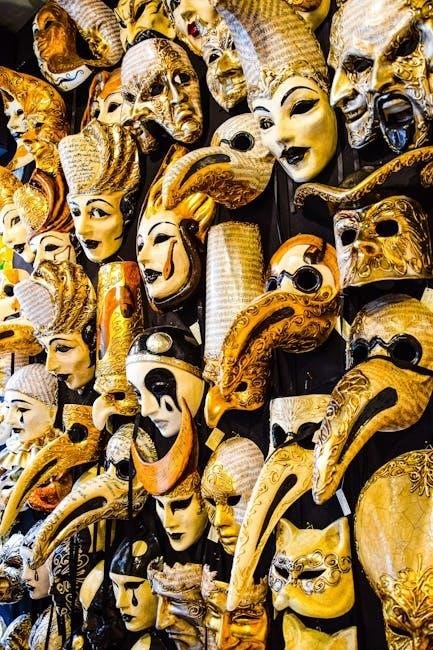
albert camus the plague pdf
Albert Camus, a renowned French philosopher and novelist, authored The Plague, a timeless exploration of human resilience and morality amidst crisis. The novel, set in Oran, delves into themes of suffering, solidarity, and existentialism; Its PDF versions are widely available, offering readers convenient access to this classic tale of survival and philosophical inquiry.
1.1 Brief Biography of Albert Camus
Albert Camus, a French-Algerian philosopher and novelist, was born in 1913 in Dréan, Algeria, and died in 1960. His work explored absurdism and existentialism. Notable works include The Plague (1947) and The Myth of Sisyphus. He won the Nobel Prize in Literature in 1957.
1.2 Historical Context of “The Plague”
Written during World War II, The Plague reflects Camus’s experiences and philosophical shifts. Published in 1947, it mirrors the French Resistance and the cholera epidemic in Oran, blending historical events with existential themes to explore human resilience and moral responsibility in crises.
1.3 The Significance of the Novel in Camus’s Work
The Plague marks a pivotal shift in Camus’s philosophy, transitioning from absurdism to rebellion. It solidified his reputation as a major literary figure, exploring themes of ethics, solidarity, and resistance. The novel’s enduring relevance underscores its importance within Camus’s oeuvre, blending narrative depth with philosophical inquiry.

Major Themes in “The Plague”
Absurdism, solidarity, and the struggle between hope and despair are central themes, reflecting human resilience and moral dilemmas during crises. The novel explores suffering, collective responsibility, and the clash between science and faith, resonating deeply with universal human experiences.
2.1 Absurdism and Existentialism
The Plague embodies Camus’s philosophy of absurdism, exploring the meaninglessness of suffering and humanity’s futile search for purpose. Existentialism is evident in Dr. Rieux’s relentless commitment to fighting the plague, illustrating the human condition’s inherent dignity and solidarity amidst absurdity.
2.2 The Concept of Suffering and Solidarity
The Plague highlights suffering as a universal human experience, fostering solidarity among individuals. Dr. Rieux’s selfless dedication and the community’s collective resilience illustrate Camus’s belief in unity and compassion as essential responses to adversity, transcending individualism and despair, as evident in the novel’s enduring PDF editions.
2.3 The Struggle Between Hope and Despair
The Plague explores the delicate balance between hope and despair, as characters like Dr. Rieux embody resilience while others, like Tarrou, confront existential bleakness. Camus illustrates how hope persists even in devastation, emphasizing human endurance and the quest for meaning amidst suffering, as reflected in the novel’s enduring themes.
Plot Summary of “The Plague”
Set in Oran, the novel recounts a city’s ordeal during a deadly plague outbreak, exploring human resilience, solidarity, and the moral challenges faced by individuals. Available in PDF format, it remains a vital exploration of crisis and collective response.
3.1 Setting: The City of Oran
The story unfolds in Oran, a French Algerian city, where the plague outbreak transforms the once vibrant metropolis into a place of isolation and despair. The setting mirrors historical events, such as the 1949 cholera epidemic, and is central to the novel’s themes of confinement and collective suffering. Available in PDF, the novel vividly portrays Oran’s transformation under the plague’s grip, highlighting the city’s role as both a character and a symbol of human resilience.
3.2 Key Characters: Dr. Rieux, Tarrou, and Others
Dr. Bernard Rieux, the protagonist, embodies moral strength and duty, leading the fight against the plague. Jean Tarrou, a mysterious figure, represents a shift from absurdism to rebellion. Other characters like Father Paneloux and Cottard add depth, exploring themes of faith, despair, and human complexity. Their journeys are central to the novel, available in PDF format for global readers.
3.3 The Progression of the Plague
The plague begins with isolated cases, escalating rapidly into widespread panic and death. Society collapses as fear and desperation grip Oran, revealing the darker aspects of human nature. The novel vividly portrays the progression of both the disease and the moral decay it precipitates, available in detailed PDF analyses.
Philosophical and Political Interpretations
The Plague serves as a profound allegory for oppression and resistance, reflecting Camus’s shift from absurdism to rebellion. Its exploration of ethics in crisis resonates deeply, available in insightful PDF commentaries.
4.1 Camus’s Transition from Absurdism to Rebellion
Camus’s The Plague marks a philosophical shift, moving beyond absurdism to emphasize rebellion against injustice. The novel portrays collective resistance, reflecting Camus’s evolving views on morality and defiance in the face of oppressive forces, as detailed in its PDF analyses.
4.2 The Plague as a Metaphor for Oppression
The novel serves as a powerful metaphor for oppression, symbolizing societal enslavement and collective suffering. Camus uses the plague to reflect historical struggles, such as Nazi occupation, and the resilience of communities in the face of oppressive forces, as explored in its PDF editions and analyses.
4.3 The Role of Ethics in Crisis
In The Plague, Camus explores the ethical dilemmas faced during crises, emphasizing moral responsibility and selflessness. Dr. Rieux’s unwavering commitment to aiding the afflicted highlights the importance of maintaining humanity amidst suffering, offering a powerful moral framework for navigating chaos, as discussed in its PDF analyses and interpretations.

“The Plague” in PDF Format
The PDF version of “The Plague” is widely available and popular, offering easy access to Camus’s profound exploration of crisis and human resilience, with key features enhancing readability.
5.1 Availability and Popularity of the PDF Version
The PDF version of Albert Camus’s The Plague is widely accessible online, with multiple sources offering free and paid downloads. Its popularity endures as readers seek digital convenience to engage with this timeless philosophical novel. Availability spans various platforms, ensuring broad reach and ease of access globally.
5.2 Key Features of the PDF Edition
The PDF edition of The Plague offers a clean, readable format with adjustable font sizes and night mode compatibility. It is lightweight, with files ranging from 5.9 MB to 8.2 MB, ensuring easy storage and accessibility on e-readers, tablets, and smartphones. The PDF includes bookmarks and a table of contents for quick navigation.
5.3 Legal and Ethical Considerations for Downloading
Downloading The Plague PDF requires adhering to copyright laws. Many versions are available legally through platforms like Scribd, ensuring authors and publishers receive fair compensation. Users should avoid pirated versions to support intellectual property rights and ethical publishing practices.

Themes of Isolation and Quarantine
The Plague explores isolation’s psychological toll and the importance of community during crises. The novel reflects historical parallels with modern pandemics, offering insights into human resilience and collective response to adversity through its vivid depiction of Oran’s quarantine.
6.1 Psychological Effects of Isolation
In The Plague, Camus portrays isolation as a catalyst for despair, anxiety, and existential introspection. The characters experience profound mental struggles, illustrating how enforced solitude erodes hope and exacerbates fear, mirroring contemporary experiences during global health crises, as noted in the PDF discussions of the novel.
6.2 The Role of Community in Crisis
Camus highlights the transformative power of community during the plague, as shared efforts and solidarity emerge to combat despair. The PDF version underscores how collective action fosters resilience, emphasizing unity as a vital response to adversity, aligning with modern analyses of crisis management and social cohesion.
6.3 Historical Parallels with Modern Pandemics
Camus’s depiction of Oran’s plague mirrors contemporary pandemic challenges, emphasizing isolation, fear, and collective resilience. The PDF editions of The Plague resonate with modern crises, offering timeless insights into human behavior and societal responses to widespread suffering and uncertainty.
The Role of Religion in “The Plague”
Religion in The Plague is explored through themes of faith, morality, and divine absence, reflecting Camus’s philosophical debates on spirituality and existentialism, as seen in various PDF analyses of the novel.
7.1 Religious Interpretations of the Plague
PDF versions of The Plague highlight religious interpretations, with the plague symbolizing divine punishment or a test of faith. Camus explores these themes, blending philosophical and theological perspectives to examine human responses to suffering and the search for meaning in a seemingly indifferent world.
7.2 The Conflict Between Faith and Science
PDF editions of The Plague reveal the tension between religious beliefs and scientific approaches during the crisis. Camus portrays doctors like Rieux embodying rationality, while religious leaders struggle to reconcile the disaster with divine will, highlighting the clash between empirical solutions and spiritual explanations in the face of suffering.
7.3 The Absence of Divine Intervention
PDF versions of The Plague highlight Camus’s exploration of a world without divine intervention. The novel portrays a seemingly indifferent universe, where suffering occurs without divine explanation or salvation, reflecting Camus’s existential themes and challenging traditional religious interpretations of catastrophe.
The Relevance of “The Plague” Today
The Plague remains strikingly relevant, offering timeless lessons on resilience and solidarity. Its themes resonate with contemporary crises, such as pandemics, underscoring the enduring importance of Camus’s philosophy in understanding human responses to adversity and fostering collective action.
8.1 Lessons for Modern Society
The Plague offers profound lessons for modern society, emphasizing solidarity, collective action, and ethical responsibility in crises. Its exploration of resilience, hope, and despair provides a timeless framework for understanding and responding to contemporary challenges, fostering a deeper appreciation for human perseverance and compassion in adversity.
8.2 The Novel’s Resonance with Contemporary Crises
Camus’s The Plague resonates deeply with modern crises, such as pandemics, offering insights into isolation, fear, and resilience. Its themes mirror today’s challenges, highlighting the enduring relevance of literature in understanding human struggle and fostering collective resilience during global hardships and uncertainties.
8.3 The Timeless Appeal of Camus’s Ideas
Camus’s exploration of absurdism, moral responsibility, and human solidarity in The Plague remains universally relevant. His ideas transcend time, addressing existential questions and offering philosophical solace during crises. The novel’s themes of resilience and ethics continue to inspire, making it a cornerstone of modern philosophical thought and literature.
Critical Reception and Reviews
Critics have praised The Plague for its profound exploration of human nature and moral dilemmas. Its PDF versions are widely popular, ensuring Camus’s philosophical insights remain accessible to contemporary readers seeking deep literary and existential engagement.
9.1 Initial Reception of the Novel
Upon its release in 1947, The Plague received acclaim for its vivid portrayal of human resilience during crisis. Critics noted its philosophical depth and Camus’s unique narrative style, solidifying its place as a literary masterpiece. The novel’s themes resonated widely, making it an instant classic in existentialist literature.
9.2 Modern Reviews and Analysis
Modern critics praise The Plague for its enduring relevance, particularly in light of contemporary crises like pandemics. Analysts highlight its exploration of solidarity, ethics, and existential themes, drawing parallels to current global challenges. The novel’s timeless appeal continues to inspire new generations of readers and scholars.
9.3 The Novel’s Impact on Literary Criticism
The Plague has profoundly influenced literary criticism, shifting focus from absurdism to collective resistance and ethical responsibility. Scholars analyze its metaphorical depth, exploring how the plague symbolizes oppression and human resilience, making it a cornerstone of philosophical and political discourse in modern literary analysis.

Comparisons with Other Works by Camus
Camus’s The Plague shares existential themes with works like The Myth of Sisyphus and The Fall, exploring absurdism and moral responsibility. PDF versions of these works highlight his philosophical depth and literary evolution.
10.1 “The Plague” vs. “The Myth of Sisyphus”
While The Plague narrates a collective struggle against a deadly disease, The Myth of Sisyphus explores individual absurdism. Both works, available in PDF, reflect Camus’s transition from absurdism to rebellion, emphasizing resilience and the search for meaning in a harsh world.
10.2 Similar Themes in “The Fall” and “Exile and the Kingdom”
The Fall and Exile and the Kingdom share themes of moral ambiguity and isolation with The Plague. These works, accessible in PDF, explore human vulnerability and the quest for meaning, reflecting Camus’s evolving philosophy on suffering and redemption across his literary corpus.
10.3 Camus’s Evolution as a Writer
Albert Camus’s writing evolved significantly, as seen in The Plague and other works. His transition from absurdism to themes of rebellion and moral responsibility is evident. PDF editions of his novels reveal his growing focus on human solidarity and ethical resilience, marking his development as a philosopher-writer.
Educational Resources and Study Guides
PDF study guides for The Plague offer in-depth analysis, essay topics, and discussion questions, aiding students in exploring Camus’s themes and philosophical insights effectively.
11.1 PDF Study Guides for “The Plague”
PDF study guides for The Plague provide comprehensive analysis, including summaries, themes, and essay topics. These resources enhance understanding of Camus’s philosophical exploration, offering insights into absurdism, solidarity, and existentialism. Available online, they are invaluable for students and scholars analyzing the novel.
11.2 Online Resources for Students
Online resources for The Plague include PDF versions, analysis, and educational materials. Platforms like Scribd and academic databases offer free or paid access to the novel and study aids, enabling students to explore themes, characters, and philosophical concepts in depth.
11.3 Essay Topics and Discussion Questions
Possible essay topics include analyzing Dr. Rieux’s moral leadership, exploring themes of solidarity, and interpreting the plague as a metaphor for oppression. Discussion questions might focus on the novel’s relevance to modern crises, the role of ethics in disaster, and the psychological impact of isolation.
Albert Camus’s The Plague remains a profound exploration of human resilience and moral clarity in the face of disaster. Its timeless themes resonate today, offering lessons on solidarity and hope. The novel’s enduring relevance ensures its continued impact in the digital age.
12.1 The Enduring Legacy of “The Plague”
The Plague remains a cornerstone of existential philosophy, its themes of solidarity and resilience transcending time. The novel’s exploration of humanity in crisis continues to resonate, offering timeless insights into morality and collective response to adversity, ensuring its enduring relevance in modern discourse and digital formats.
12.2 The Importance of Reading “The Plague” in the Digital Age
The digital age offers unparalleled access to The Plague through PDF formats, making Camus’s profound reflections on humanity and crisis more accessible than ever. Reading it today provides timeless insights into resilience, solidarity, and moral responsibility, inviting readers to reflect on contemporary challenges through a philosophical lens.
12.3 Final Thoughts on Camus’s Timeless Philosophy
Camus’s philosophy, as explored in The Plague, endures as a beacon of moral clarity and existential inquiry. His themes of resilience, solidarity, and the absurd resonate deeply, offering readers a framework to navigate life’s complexities and crises with courage and ethical awareness, transcending time and context.